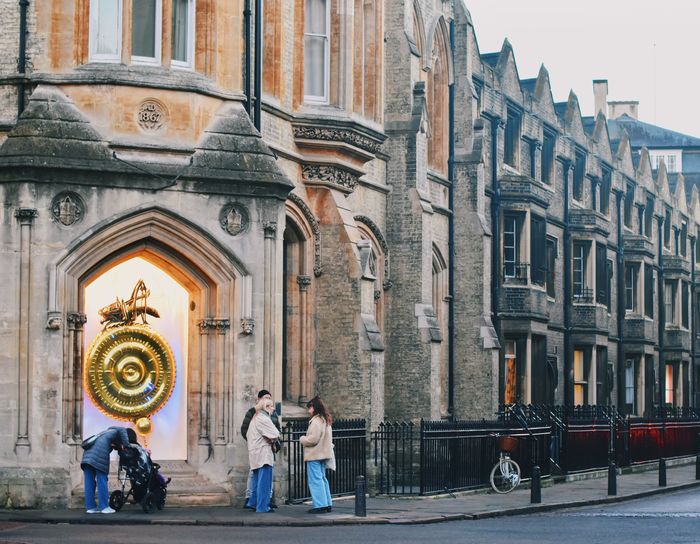Buying into belonging
In the last instalment of her column, Laura Solomon discusses the complex relationship experienced by bursary recipients and their time at the University among financial anxiety

‘The Cambridge Bursary’ is a lifesaver. It offers not just financial security, but comfort, bridging the gap between SFE’s maintenance loan and what it takes to lead a student’s life. For many, the bursary represents much more than a thousand (or so) extra every term. No strings attached. The Cambridge Bursary Scheme represents the opportunity for students to whom Cambridge seems a world away to step a bit closer and to feel a bit more at home at Cambridge. It allows us a sense of freedo — independence even — a tantalising taste of the blanket of financial security that a university degree is supposed to secure you.
But fundamentally, the bursary also represents a lack. You need the bursary when your peers do not. The bursary, for many, is just another indication that your income, that your background, isn’t sufficient. The cries of ‘you’re so lucky!’, although understandable if someone falls just over the household income of £62,215 needed to qualify, seem short-sighted and ignorant. Fortune is being born into financial and familial security, to private schooling and tutoring.
“Financial anxiety is the legacy of financial troubles and a telltale sign that you haven’t always had access to the Cambridge bursary”
The anxiety may still be there, an itch that persists as you walk through the aisles of ‘Mainsburys’, clenching your wallet as you scan the isles, comparing which pasta is cheapest per 100g. Financial anxiety is not just ‘living like a student’, but a legacy of financial troubles and a telltale sign that you haven’t always had access to the Cambridge bursary. There lingers a feeling of scrimping, saving, counting and tallying, a fear that one minute you’ll turn around and Cambridge, the security, the future jobs and financial stability will be wrenched from your grasp. You can’t hold tightly enough onto it. The bursary goes far, but perhaps falls just short of making you feel like you actually belong here and, if anything, ever will.
On a more general note, however, the bursary is not a universal experience and I doubt that any two people’s relationships with it are the same. The fact is that everyone here has a different financial situation, whether your parents pay your rent, your tuition or your day to day living (or nothing at all). The economics of student life too often become a source of shame, in either direction. There is on one side the path on which your parents still support you and with it the concern that you are not truly living the student life, still dependent on them. The construction of shame alongside privilege should be met with transparency and mutual openness. It only becomes shameful in a refusal to acknowledge it. At an institution where we are contractually obliged to remain unemployed, it feels as if where our money comes from, how we have ‘earnt’ it, is as important as our education.
“Sharing is caring and healing money anxiety is only going to happen through the formation of dialogue”
Attitudes to money, though, remain a fascinating part of Cambridge culture. There are those who spend and those who attempt to save, foreseeing a jobless future in an unemployable climate. Yet, the most surprising part to me? Attitudes to money, although related, have no necessary mutuality with your real financial position. It is a cultural attitude. Of squirrelling or splurging, doing whichever makes you feel more comfortable in an environment where wealth seems the defining factor. Our personal financial positions form the backbone of our sphere as they determine relationships and inform friendships. Attitudes towards money manifest in so many aspects of social life. Remembering someone hasn’t paid you back but being afraid to ask lest you be perceived as stingy or the anxiety from paying for a round: money shapes and paralyses. It induces fear but also a sense of safety when you see the bursary arrive in your account at the beginning of term.
The monetisation of our education system itself (thanks Blair) has also introduced new dynamics. Strikes and the pandemic have caused many to ask for more transparency (and refunds) in regards to how our tuition is used. Students are entering the world of debt based on the promise and potential of future financial security. Our experience certainly seems more financially wise than other universities, with access to supervisions and leading academics — to some degree at least, it feels like we are getting our money’s worth. Tuition fees are meant to make us appreciate our education, but I see them as more anxiety inspiring, cultivating a resentment towards our Directors of Studies for not giving us better supervisors and breeding animosity if we feel our education is not delivering what it promised. This, I have found, not only feeds my current money anxiety but future concern for potential employment, pressure cooking every contact hour I have to ensure I am getting my ‘money’s worth’.
From the bursary to tuition fees, university life seems to be moulded around bank balances, whether your’s or your parents. But it is not just the reality of those figures, it is attitudes, customs and values. It is anxiety and furrowed brows, judgement or a pit in the stomach that will shape your experience. Whether it be stories of debt or familial dependency, every financial situation is worth being open about. Sharing is caring and healing money anxiety is only going to happen through the formation of dialogue.
 Features / Should I stay or should I go? Cambridge students and alumni reflect on how their memories stay with them15 December 2025
Features / Should I stay or should I go? Cambridge students and alumni reflect on how their memories stay with them15 December 2025 News / Cambridge study finds students learn better with notes than AI13 December 2025
News / Cambridge study finds students learn better with notes than AI13 December 2025 News / Uni Scout and Guide Club affirms trans inclusion 12 December 2025
News / Uni Scout and Guide Club affirms trans inclusion 12 December 2025 Comment / The magic of an eight-week term15 December 2025
Comment / The magic of an eight-week term15 December 2025 News / News In Brief: Michaelmas marriages, monogamous mammals, and messaging manipulation15 December 2025
News / News In Brief: Michaelmas marriages, monogamous mammals, and messaging manipulation15 December 2025










